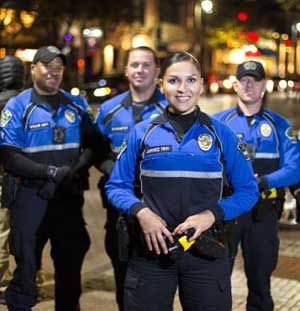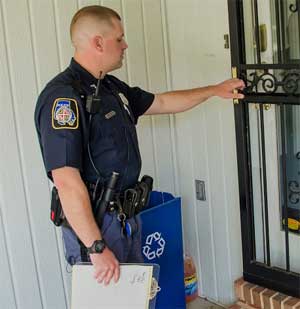 There are two types of disqualifiers, automatic disqualifiers and discretionary disqualifiers. Automatic disqualifiers are things that will automatically stop an applicant from being hired or even being considered for employment by a law enforcement agency. There are no exceptions or waivers for automatic disqualifiers. Discretionary disqualifiers are things which are evaluated on a case-by-case basis. The list of automatic disqualifers will vary from state to state and also by department. Generally, the list of automatic disqualifiers is on the website for the Peace Officer Standards and Training or POST website for each state, and is also listed on law enforcement agencies website. I is vital to look at the list of disqualifiers to make certain that nothing on the list applies to you.
There are two types of disqualifiers, automatic disqualifiers and discretionary disqualifiers. Automatic disqualifiers are things that will automatically stop an applicant from being hired or even being considered for employment by a law enforcement agency. There are no exceptions or waivers for automatic disqualifiers. Discretionary disqualifiers are things which are evaluated on a case-by-case basis. The list of automatic disqualifers will vary from state to state and also by department. Generally, the list of automatic disqualifiers is on the website for the Peace Officer Standards and Training or POST website for each state, and is also listed on law enforcement agencies website. I is vital to look at the list of disqualifiers to make certain that nothing on the list applies to you.
Automatic Disqualifiers
One example of an automatic disqualifier is if you have a felony or misdemeanor criminal conviction for domestic violence. Federal law bans individuals convicted of a crime of domestic violence, whether it is a felony or misdemeanor, from possessing a firearm. Since possessing a firearm is a requirement of being a sworn law enforcement officer, such persons would not be able to carry out the duties of a law enforcement officer and thus it is an automatic disqualifier. Other types of automatic disqualifiers would include being convicted of crimes involving moral turpitude or honesty, whether it is a felony or a misdemeanor.
Discretionary Disqualifiers
Discretionary disqualifiers are going to vary greatly from department to department. One example of this would be an applicants’ driving record. An automatic disqualifier might include receiving a 3 speeding tickets within the past year. However, for an applicant that has received 3 speeding tickets within the past 5 years, that would be evaluated on a case-by-case basis and thus would be a discretionary disqualifier.

Being involved in a prior illegal occupation, selling illegal weapons, drug trafficking, whether or not you were convicted or even caught, would be a disqualifier.
Failure to pay debts could be a disqualifier. If somebody owes money all over town, that certainly could be a disqualifier. If an applicant has been discharged from the military under less than honorable discharge, this could and generally would be a disqualifier.
Illicit substance use can be a disqualifier, and it’s going to vary greatly by department. Often, agencies will list what types of substance use will be disqualifying. The time period when the prohibited use occurred is going to vary. So, for instance, the agency may list different illicit substances and if you’ve used those substances within the last so many years, you’re disqualified.
Intentionally omitting information or putting down false information on an application, forms related to the application, or during the background process, will be considered an automatic disqualifier for any jobs in law enforcement. Even if the information which is being concealed would not itself be considered an automatic disqualifier, the act of trying to cover it up is an automatic disqualifier. It is very unfortunate when an applicant is removed from consideration because they attempted to conceal something that would not have prevented them from being hired.
Even if an applicant has been hired, gone through the academy, and is now working patrol, if it has been determined that they falsified information during their application or background process, they will be terminated.
How do agencies find out about disqualifying information
When applying for law enforcement jobs, an applicant will fill out an application and often there are documents to complete associated with the application. Often during the hiring process you 
What is checked about your during the background investigation
- Credit Report
- Driving Record
- Social Media
- Employment History
- Criminal History
- References
- Interviews of friends, neighbors and co-workers
- Polygraph
Police Background Investigation

A background investigator from the hiring agency will be assigned to conduct your background investigation. This may be a sworn officer from that agency, it may be a non-sworn personnel whose main job is conducting background investigations. Some federal law enforcement agencies hire private companies to conduct background investigations. These companies hire former federal agents and police officers.
The background investigator may meet with you are the beginning of the background investigation to go over everything that you have filled out.
Credit Report
As part of the background investigation, the hiring agency will run a credit report on you. What they are looking for is a history of being financially irresponsibility. If you are making poor financial decisions in your life, you defaulted on loans, you owe a lot of money, you may be a poor choice to work for that agency. A police officer whose personal life is a mess financially is a situation agencies want to avoid.
Driving Record

Social Media
When going into all types of law enforcement jobs, it’s vital that you demonstrate good character and good judgment. So, it’s never too early to start cleaning up that trail. Social media is one of the biggest trails these days. The background investigator may conduct a police interview with you and ask you about all of your social media accounts. There shouldn’t be anything on social media which reflects poorly upon you. There shouldn’t be any pictures of you doing drugs, and there shouldn’t be pictures of others doing drugs on your social media profiles. No drug references no matter how funny they may be. Nothing alcohol-related even if you are of legal age. Coming across as a hard-drinking party animal is not the image you want to portray to your possible law enforcement employer.

Nothing anti-government. Remember, when you go to work in law enforcement, you are going to work for the government. Be careful of overly pro-law enforcement stuff. Obviously, you are pro-law enforcement because you want to go into law enforcement as a career, and you want to show your support. However, agencies are very nervous about pro-law enforcement items being taken the wrong way.
Many departments tell their personnel not to make any comments on social media regarding law enforcement issues, including officer-involved shootings. So, make sure that you are very cautious about posting pro-law enforcement-related information.

There should be nothing racist, nothing sexist, and nothing discriminatory in any way possible posted on Facebook, Twitter or any other social media. If you do have such things, take them down and take them down immediately. Also, be very cautious if you have Facebook friends with people that have this sort of thing on their website.
Get a professional sounding email address. Most people for their email address will have their first name and their last name. Make sure it isn’t something such as joe@lovemonkey.com. Make sure it reflects positively upon yourself and your future professional career.
Google yourself. See what comes up. If there’s anything negative about you that needs to be addressed, the sooner, the better for taking care of that. This is important whether your are applying to be a police officer or a crime analyst.
Employment History
The background investigator will speak with your prior employers. They want to find out if you have ever been terminated and is so for what reasons. Were there any disciplinary actions against you. What was your general work ethic was. Were you a reliable employee, did you show up on time, were you dependable.
If you happened to have a bad experience with one job, it still needs to be listed on all of you paperwork. Having an unexplained gap in employment can be a red flag. Also, if it is determined that you intentionally omitted a job, that by itself will be grounds for disqualification.
Criminal History

References
The background investigator will speak with your references. Often you will be asked to provide professional and personnel references. The background investigator will ask the reference if there 
Depending upon the depth of the background investigation and the sensitivity of the job that you are applying for, the background investigator may speak with current and former neighbors, classmates, friends, and co-workers. If you are applying for a job such as a Special Agent with the FBI, that requires a full field investigation to qualify for a Top Secret clearance. This will involve going back several years.
The Police Polygraph
A polygraph is not part of the police requirements for all agencies and all jobs within an agency. Whether or not a polygraph is required will vary be agency and by the position you are applying for. Some agencies use voice stress analysis (VSA) or computer voice stress analysis (CSVA) rather than a polygraph machines. During the background it will likely come up if you have failed a polygraph exam (or other related device) with another agency. If you failed a polygraph examination with another agency, even though the agency that you are applying with now does not use a polygraph, that fact that you failed a polygraph during the hiring process with another agency may be a reason for disqualification.
There will be several police polygraph questions asked. The examiner will go over the questions with you ahead of time. This is done so that you have time to think about the questions that you will be answering. There will be a couple of control questions you will answer, such as “are the lights on in the room.” If there are areas of the polygraph where it appears that you have not answered accurately, the background investigator will follow-up on those items to investigate further.
The hiring agencies is not expecting every applicant to have a flawless background. They do however require applicants to be fully truthful about their backgrounds. During the background investigation you will be asked if you have failed a background investigation with any other agencies that you have applied for.

 Joseph Libowsky,
Joseph Libowsky,